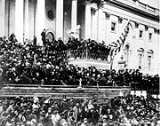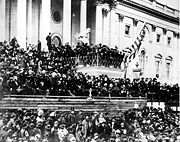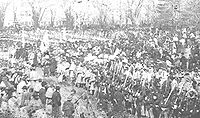
Lincoln's second inaugural address
Encyclopedia


Abraham Lincoln
Abraham Lincoln was the 16th President of the United States, serving from March 1861 until his assassination in April 1865. He successfully led his country through a great constitutional, military and moral crisis – the American Civil War – preserving the Union, while ending slavery, and...
delivered his second inaugural address on March 4, 1865, during his second inauguration
Second inauguration of Abraham Lincoln
The second inauguration of Abraham Lincoln as the 16th President of the United States took place on March 4, 1865. The inauguration marked the commencement of the second term of Abraham Lincoln as President and only term of Andrew Johnson as Vice President. Chief Justice Salmon P...
as President of the United States
President of the United States
The President of the United States of America is the head of state and head of government of the United States. The president leads the executive branch of the federal government and is the commander-in-chief of the United States Armed Forces....
. At a time when victory over the secessionists in the American Civil War
American Civil War
The American Civil War was a civil war fought in the United States of America. In response to the election of Abraham Lincoln as President of the United States, 11 southern slave states declared their secession from the United States and formed the Confederate States of America ; the other 25...
was within days and slavery
Slavery
Slavery is a system under which people are treated as property to be bought and sold, and are forced to work. Slaves can be held against their will from the time of their capture, purchase or birth, and deprived of the right to leave, to refuse to work, or to demand compensation...
was near an end, Lincoln did not speak of happiness, but of sadness. Some see this speech as a defense of his pragmatic approach to Reconstruction, in which he sought to avoid harsh treatment of the defeated South by reminding his listeners of how wrong both sides had been in imagining what lay before them when the war began four years earlier. Lincoln balanced that rejection of triumphalism, however, with a recognition of the unmistakable evil of slavery, which he described in the most concrete terms possible. He could not know that John Wilkes Booth
John Wilkes Booth
John Wilkes Booth was an American stage actor who assassinated President Abraham Lincoln at Ford's Theatre, in Washington, D.C., on April 14, 1865. Booth was a member of the prominent 19th century Booth theatrical family from Maryland and, by the 1860s, was a well-known actor...
, David Herold
David Herold
David Edgar Herold was an accomplice of John Wilkes Booth in the assassination of Abraham Lincoln. After guiding fellow conspirator Lewis Powell to the home of Secretary of State William H. Seward, whom Powell intended to kill, Herold fled and rendezvoused outside of Washington, D.C., with Booth...
, George Atzerodt
George Atzerodt
George Andreas Atzerodt was a conspirator, with John Wilkes Booth, in the assassination of Abraham Lincoln. Assigned to assassinate Vice-President Andrew Johnson, he lost his nerve and did not make an attempt. He was executed along with three other conspirators by hanging.-Early life:Atzerodt...
, Lewis Paine, John Surratt
John Surratt
John Harrison Surratt, Jr. was accused of plotting with John Wilkes Booth to kidnap U.S. president Abraham Lincoln and suspected of involvement in the Abraham Lincoln assassination. His mother Mary Surratt was convicted of conspiracy and hanged by the United States Federal Government...
and Edmund Spangler
Edmund Spangler
Edmund Spangler , also known as Edman, Edward, and Ned Spangler, was originally from York, Pennsylvania, but he spent the majority of his life in the Baltimore, Maryland area...
, some of the conspirators involved with his assassination
Abraham Lincoln assassination
The assassination of United States President Abraham Lincoln took place on Good Friday, April 14, 1865, as the American Civil War was drawing to a close. The assassination occurred five days after the commanding General of the Army of Northern Virginia, Robert E. Lee, and his battered Army of...
, were present in the crowd at the inauguration. The address is inscribed, along with the Gettysburg Address
Gettysburg Address
The Gettysburg Address is a speech by U.S. President Abraham Lincoln and is one of the most well-known speeches in United States history. It was delivered by Lincoln during the American Civil War, on the afternoon of Thursday, November 19, 1863, at the dedication of the Soldiers' National Cemetery...
, in the Lincoln Memorial
Lincoln Memorial
The Lincoln Memorial is an American memorial built to honor the 16th President of the United States, Abraham Lincoln. It is located on the National Mall in Washington, D.C. The architect was Henry Bacon, the sculptor of the main statue was Daniel Chester French, and the painter of the interior...
.
Sources and themes
The words "wringing their bread from the sweat of other men's faces" are an allusion to the Fall of Man in the book of Genesis. As a result of Adam's sin, God tells Adam that henceforth "In the sweat of thy face shalt thou eat bread, till thou return unto the ground; for out of it wast thou taken: for dust thou art, and unto dust shalt thou return" (Gen. 3:19, King James Version).Lincoln's phrase, "but let us judge not, that we be not judged," is an allusion to the words of Jesus in Matthew 7:1, which in the King James Version reads, "Judge not, that ye be not judged."
Lincoln quotes another of the sayings of Jesus
Jesus
Jesus of Nazareth , commonly referred to as Jesus Christ or simply as Jesus or Christ, is the central figure of Christianity...
: "Woe unto the world because of offenses; for it must needs be that offenses come, but woe to that man by whom the offense cometh." Lincoln's quoted language comes from Matthew
Gospel of Matthew
The Gospel According to Matthew is one of the four canonical gospels, one of the three synoptic gospels, and the first book of the New Testament. It tells of the life, ministry, death, and resurrection of Jesus of Nazareth...
18:7; a similar discourse by Jesus appears in Luke
Gospel of Luke
The Gospel According to Luke , commonly shortened to the Gospel of Luke or simply Luke, is the third and longest of the four canonical Gospels. This synoptic gospel is an account of the life and ministry of Jesus of Nazareth. It details his story from the events of his birth to his Ascension.The...
17:1.
The quotation 'the judgments of the Lord are true and righteous altogether' is from Psalm 19:9 in the King James Bible.
Lincoln's points, that God's purposes are not directly knowable to humans, represent a theme that Lincoln had expressed earlier. After Lincoln's death, his secretaries found among his papers an undated manuscript now generally known as the "Meditations on the Divine Will". In that manuscript, Lincoln wrote:
- The will of God prevails — In great contests each party claims to act in accordance with the will of God. Both may be, and one must be wrong. God cannot be for, and against the same thing at the same time. In the present civil war it is quite possible that God's purpose is somewhat different from the purpose of either party — and yet the human instrumentalities, working just as they do, are of the best adaptation to effect this.
Lincoln's sense that the divine will was unknowable stood in marked contrast to sentiments popular at the time. In the popular mind, both sides of the Civil War assumed that they could read God's will and assumed his favor in their opposing causes. Julia Ward Howe
Julia Ward Howe
Julia Ward Howe was a prominent American abolitionist, social activist, and poet, most famous as the author of "The Battle Hymn of the Republic".-Biography:...
's Battle Hymn of the Republic expressed sentiments common among the supporters of the Union cause, that the Union was waging a righteous war that served God's purposes. Similarly, the Confederacy
Confederate States of America
The Confederate States of America was a government set up from 1861 to 1865 by 11 Southern slave states of the United States of America that had declared their secession from the U.S...
chose Deo vindice as its motto
Motto
A motto is a phrase meant to formally summarize the general motivation or intention of a social group or organization. A motto may be in any language, but Latin is the most used. The local language is usual in the mottoes of governments...
, often translated as "God will vindicate us." Lincoln, responding to compliments from Thurlow Weed
Thurlow Weed
Thurlow Weed was a New York newspaper publisher, politician, and party boss. He was the principal political advisor to the prominent New York politician William H...
on the speech, said that "... I believe it is not immediately popular. Men are not flattered by being shown that there has been a difference of purpose between the Almighty and them."
See also
- Lincoln's first inaugural addressLincoln's first inaugural addressAbraham Lincoln's first inaugural address was delivered by President Abraham Lincoln, on Monday, March 4, 1861, as part of his taking of the oath of office for his first term as the sixteenth President of the United States...
- Second inauguration of Abraham LincolnSecond inauguration of Abraham LincolnThe second inauguration of Abraham Lincoln as the 16th President of the United States took place on March 4, 1865. The inauguration marked the commencement of the second term of Abraham Lincoln as President and only term of Andrew Johnson as Vice President. Chief Justice Salmon P...

